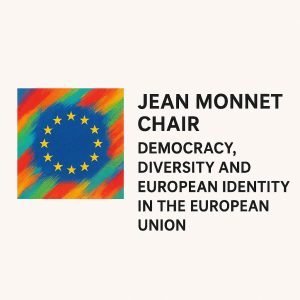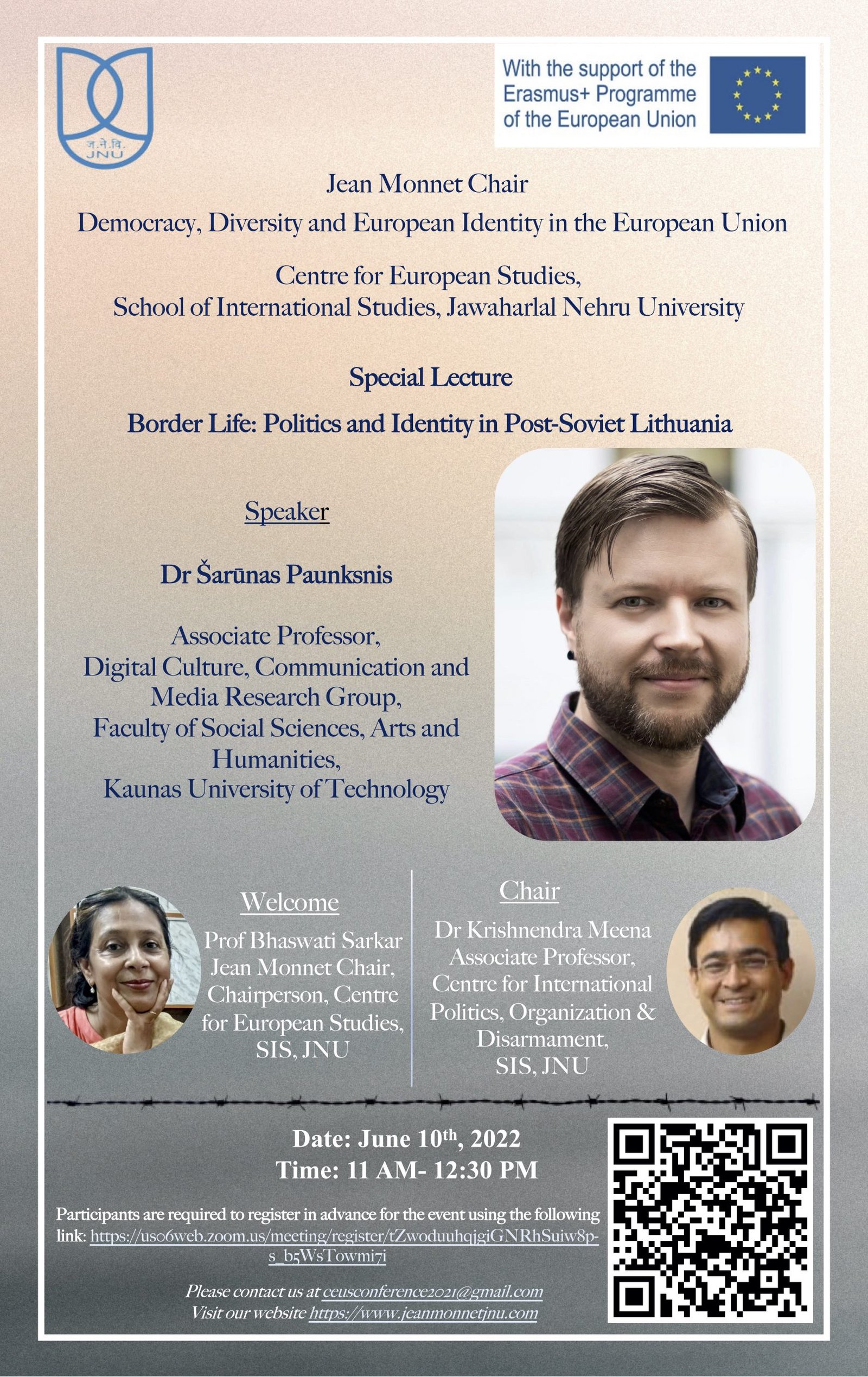
- This event has passed.
Special Lecture – “Border Life: Politics and Identity in Post-Soviet Lithuania”


Event Report
The Jean Monnet Chair on Democracy, Diversity and European Identity in the
European Union at the Centre for European Studies in the School of International
Studies (SIS), Jawaharlal Nehru University (JNU) organised a Special Lecture by a
Lithuanian scholar Dr Šarūnas Paunksnis on June 10 th , 2022. The event was hosted
online over Zoom on the topic “Border Life: Politics and Identity in Post-Soviet
Lithuania”.
Dr Šarūnas Paunksnis is an Associate Professor in Digital Culture, Communication
and Media Research Group at the Faculty of Social Sciences, Arts and Humanities at
the Kaunas University of Technology. His areas of interest include new media, Indian
cinema, science and technology studies, and post-colonial theory among others. Dr
Paunksnis is also both a Fulbright and a Chevening alumnus who has been associated
with several reputed institutions such as the Columbia University in New York and
SOAS University of London, as well as with Jawaharlal Nehru University in India.
He is the author of two books: Dislocating Globality: Deterritorialization, Difference
and Resistance (2016) and Dark Fear, Eerie Cities: New Hindi Cinema in Neoliberal
India (2019).
The lecture commenced with a welcome note from Prof Bhaswati Sarkar, Jean
Monnet Chair and the Chairperson at the Centre for European Studies, who
introduced the speaker. The session was chaired by Dr Krishnendra Meena, Associate
Professor at the Centre for International Politics, Organisation & Disarmament
(CIPOD), SIS, JNU who specialises in geopolitics. Prof Sarkar set the tone for the
lecture by highlighting some of the key issues related to borders – both territorial ones
and those constructed by individuals and communities to create the binaries of ‘us’
and ‘them’. Specifically, in the context of Europe, this has led to a twofold
phenomenon; while on one hand, the European Union (EU) has created permeable
borders facilitating the easy flow of people, goods and services, on the other,
watertight divisions created by individuals and communities based on identity have
contributed to strong feelings of ‘us vs. them’ which in turn has paved the way for
increasing xenophobic sentiments. In this context, Dr Paunksnis delved into the issues
of identity and self-perception of Lithuanians as a part of Europe.
The singularity of Lithuanian identity stems from the fact that although the country is
geographically located on the eastern fringes of Europe, it perceives itself as a
Western European state. The speaker traced this aspect of Lithuanian identity to the
legacy of its medieval history and the major developments that shaped it in the 20 th
century. Dr Paunksnis argued that national pride rooted in the medieval Grand Duchy
of Lithuania extending from the Baltic to the Black sea and the strong lingering
influence of its indigenous traditions spurned the suppression of Lithuanian national
culture and statehood under the Polish Lithuanian Commonwealth. Similarly, the
country also silently protested against its occupation by the erstwhile Soviet Union
not only through forms of non-cooperation but also by creating a sense of
belongingness to Western Europe. Nevertheless, Lithuania’s independence in the
1990s once again re-emphasized its geographical location in the margins of Europe
and created an ambiguity that the speaker critically assessed. First, despite Lithuania’s
sense of belongingness to Western Europe, the Russian language continued to be
strongly relevant immediately in the post-independence period. The predominance of
Russian as the only foreign language coupled with the near absence of indigenous
substitutes kept the people reliant on the Russian media for both news and
entertainment. Secondly, the collapse of the erstwhile Soviet Union paved the way for
migration to Western European countries where the immigrants found themselves
being perceived as the ‘other’ and engaged only as unqualified labourers, factory
workers or maids. This led to a loss of idealism about the West that shaped
Lithuania’s identity in the 21 st century as a border state. This absorbing lecture
succinctly summed up Lithuania as a country that continues to exist as a liminal state
in the margins of Europe with an ‘in-between culture’ touching both Western Europe
and Russia but belonging to neither.
The discourse was followed by a lively Q&A session. The event was attended by
more than 40 participants, mostly based out of Delhi NCR. Data collected during the
event reveal that an overwhelming 85 per cent of them are research scholars who
found the lecture to be very informative regarding European identity and the post-
colonial narrative in Lithuania.
